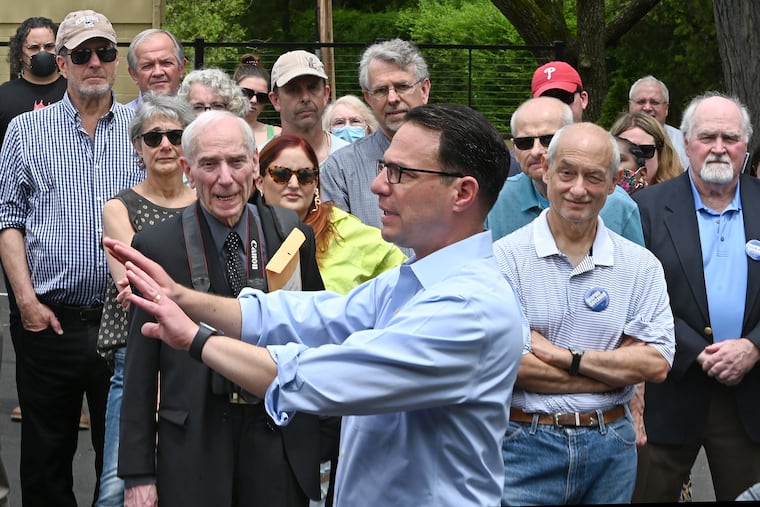‘Gas tax refund’ giveaway presents big, inequitable hit to state budget | Editorial
A rebate proposal by the Democratic candidate for governor leaves too many families behind.

The day after Memorial Day — when many drivers have just spent a portion of their paychecks on gas for holiday weekend getaways — might be an inopportune time to weigh in against an idea that would take some of the sting out of paying at the pump. But when a policy proposal is this concerning, it must be done.
Josh Shapiro, the Democratic candidate for governor, has put forth a plan to offer what he calls “a gas tax refund” of $250 per car (up to a max of four cars) to each family in the commonwealth.
The spirit behind Shapiro’s proposal — showing solidarity with Pennsylvanians who are struggling to cope with higher prices — is laudable. But his plan misses too many needy families, while also sending a disproportionate amount of money to the state’s top income earners.
According to census data, more than half a million Pennsylvania households are without cars. While gas prices might not be taking the same bite out of their budgets, those households still face rising costs in rent, energy, and food, just like the state’s motorists. Car-free households also typically have fewer financial resources to begin with: The average income of car-free households in Pennsylvania is just over $20,000 a year, less than a third of the state’s median income.
» READ MORE: Should Pennsylvanians get a gas tax rebate? | Pro/Con
Unlike the half a million families who will get nothing from Shapiro’s plan, the 300,000 families who report having four or more vehicles will get $1,000. While car-free households hover near the poverty line, the median income of households with at least four cars is $120,000.
Beyond the unequal distribution of money, it could represent a significant expense for the state. Shapiro has said that he would pay for the first year of the proposal using unspent American Rescue Plan funds. Were the refund to be extended for a second year, it could translate into a top cost of $2 billion. While the state does have a budget surplus, it also has significant needs. Philadelphia has toxic schools and record gun violence. Rural Pennsylvania schools also have significant financial difficulties. Every dollar spent on this political gimmick would be a dollar not spent on other important priorities.
Shapiro’s plan is better than Republican proposals to cut or suspend the gas tax, a move that detractors fear would simply transfer money from state coffers to the bank accounts of oil companies. But many of the same criticisms that have been leveled against a gas tax suspension also apply to Shapiro’s rebate plan.
» READ MORE: America loves guns more than kids. Uvalde is just more proof. | Editorial
It is unlikely that Shapiro will change his mind on a proposal that he’s made such a major part of his campaign, but it is essential that he at least consider ways to temper the damage. Limiting the proposal to two cars, for example, could save hundreds of millions of dollars.
Also needed is a fairer benefit for zero-car households. In other states, relief proposals have included benefits to transit riders. In California, for example, Gov. Gavin Newsom is providing those who use public transportation with $750 million in subsidized fares.
According to the Philadelphia Transit Riders Union, providing subsidized transit to low-income riders statewide would cost just $90 million.
Given the stakes of this election, it is not surprising that Shapiro would reach for any advantage to ensure a win in November. Still, taking the opportunity to make this proposal fairer and include more Pennsylvanians is the right thing to do.
Editor’s note: This article has been updated to clarify the funding source for the gas tax refund.